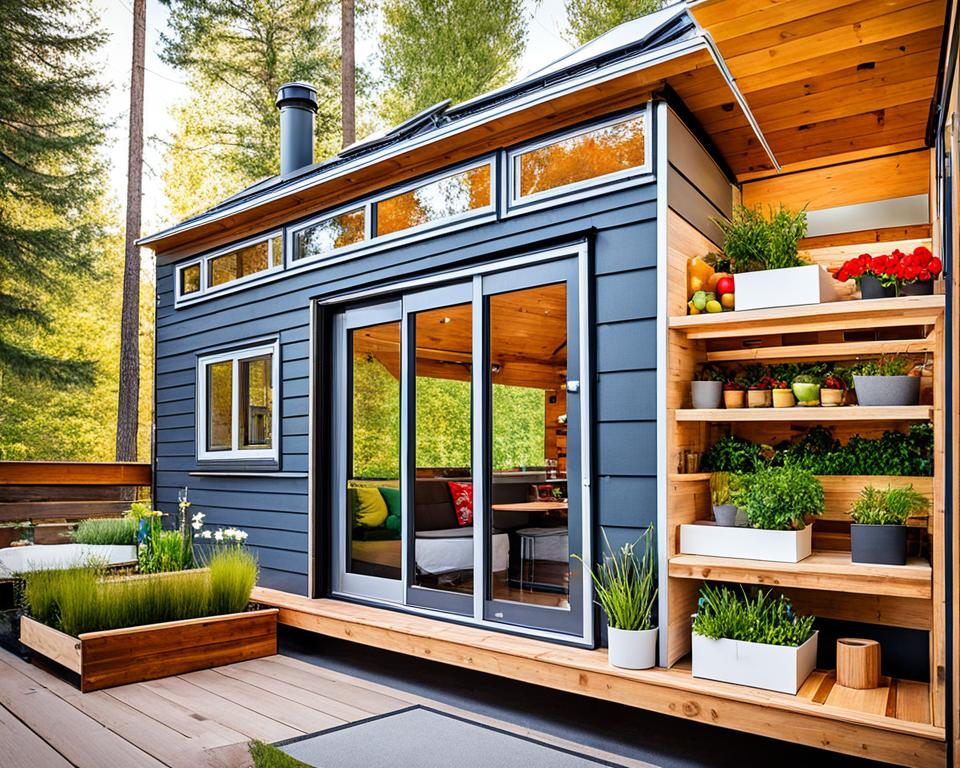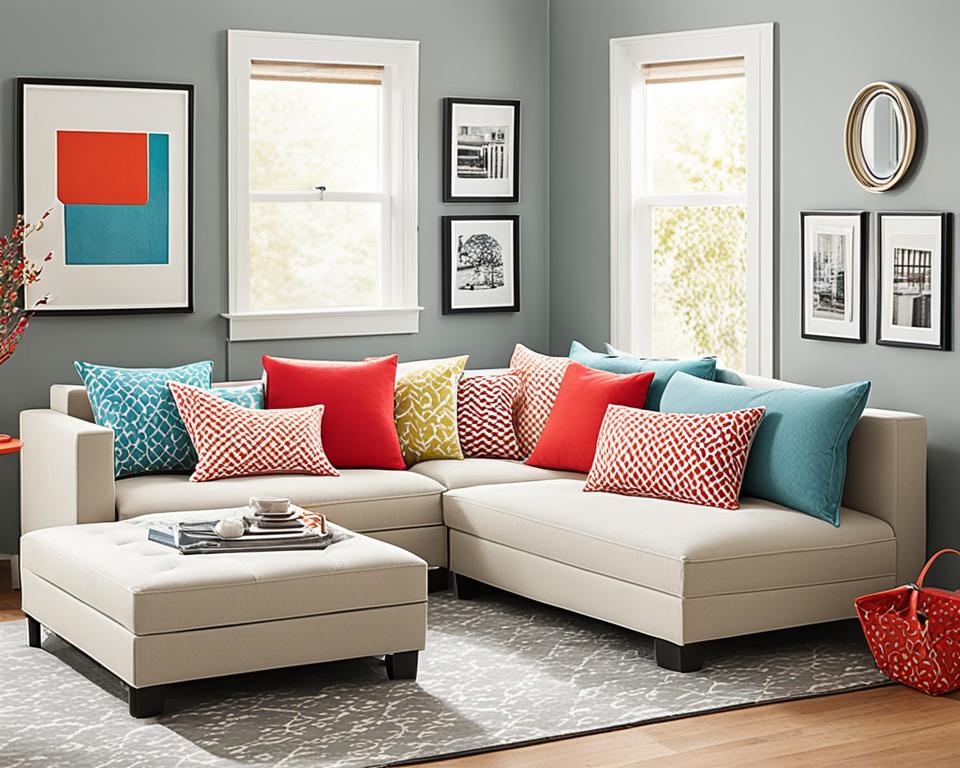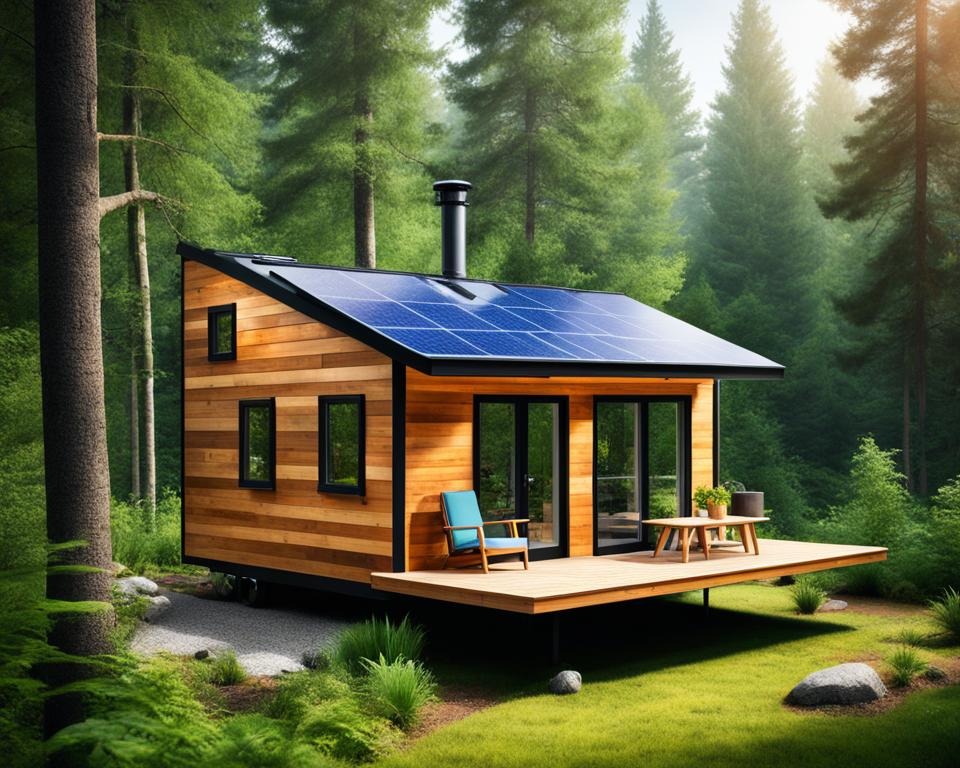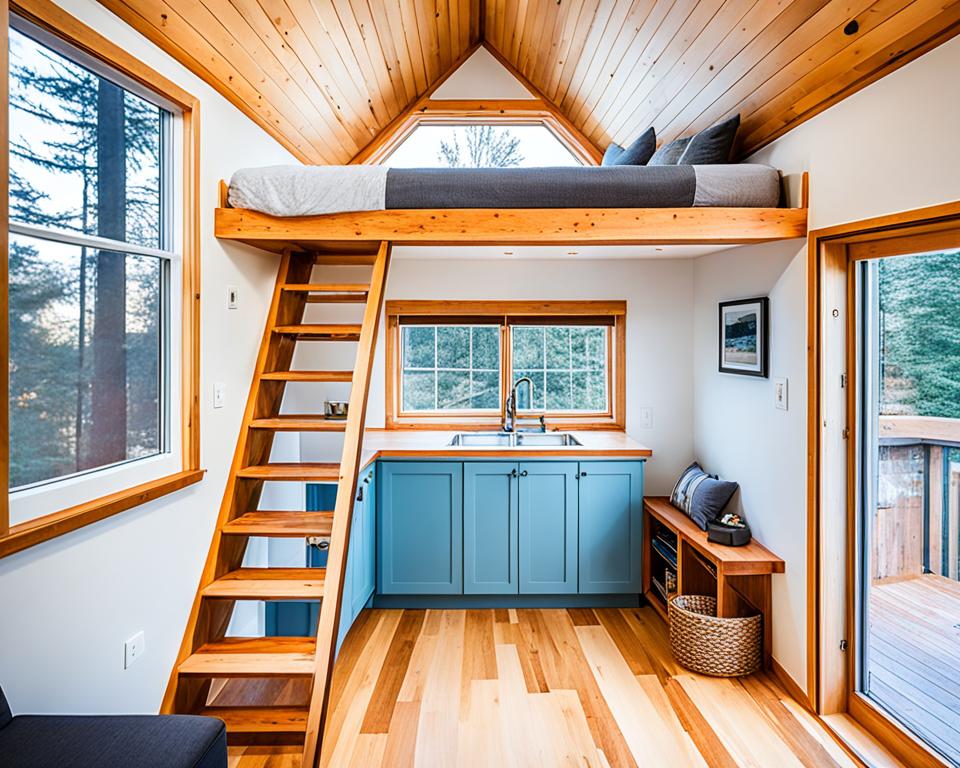Is it possible that tiny house design can change our views on spacious living? We’ve looked closely at small home designs and found they offer big benefits. These designs prove that living small can be both eco-friendly and stylish.
Tiny homes aren’t just about cutting down space. They’re about smart use of every square inch. Our designs highlight the best in small space living. They show that living well doesn’t need a lot of space, just smart planning.
Our goal is to blend style with practicality in tiny homes. We want to show that small spaces can offer a great living experience. Join us as we explore how tiny houses use smart design to save resources and provide a great lifestyle.
Maximizing Tiny Interiors with Clever Color and Decor Choices
Design choices in a tiny house are super important. They help create a feeling of more space. We use minimalist and smart design tricks to make areas feel open yet cozy.
Adopting a Neutral Palette for Spacious Illusions
Neutral colors make small spaces look bigger. Light whites and soft grays make rooms feel airy. This not only makes the space look larger but also allows easy decor changes. Our designs stay fresh and flexible.
Introducing Patterns and Pops of Color Mindfully
We carefully add colors and patterns to bring life to spaces. A teal backsplash or mosaic tiles in the bathroom add charm. These touches fit our green house plans and show that small spaces can have big personality.
Incorporating Natural Accents for Sustainable Living
We use natural materials to make our designs eco-friendly. Reclaimed wood and low-VOC paints reduce our environmental impact. Adding plants or shiplap walls brings nature indoors, making our homes feel peaceful.
Tiny House Design for Enhanced Functionality and Aesthetics

As tiny house design enthusiasts, we are always on the lookout for ways to blend aesthetics and utility. Space-saving design ideas go beyond just using less space. They’re about creating innovative living solutions. In minimalist living, every design decision is deliberate, aimed at making spaces welcoming and functional.
Floating shelves offer a neat solution for displaying treasures without sacrificing floor space. Hideaway tables show the ingenuity of furniture that serves multiple purposes. Such items prove that tiny house design is full of clever solutions.
French doors and big windows help to remove the barrier between inside and the outside world. They maximize natural light and make spaces feel larger. Be it a skylight or a well-placed sconce, proper lighting is key to making small spaces feel bigger.
To us, minimalist living means more than just having fewer things. It’s about making the most of every area. We aim for a lifestyle that is free from clutter but rich in style.
Transformative Furniture for Space Efficiency in Tiny Homes

Choosing to live in a tiny home is not just about saving space. It’s also a dive into the beauty of simplicity. Our goal is to blend space-saving designs with modern style. This appeals to both dedicated minimalists and those new to small living spaces. The exciting part is seeing how tiny home designs blend with sustainable features.
Starting your tiny living journey involves picking the right furniture. It should meet our needs for both look and space. Multifunctional furniture is key to using our space well. For example, tables with hidden spots or beds that turn into seating show how versatile our rooms can be. This way, we enjoy all the comforts without the mess.
Selecting Multi-Purpose Furniture with Style
Picture a coffee table that changes into a soft ottoman, or a desk that grows for more storage. These pieces show the power of flexible design. By choosing items that serve more than one purpose, we make every piece count. This approach means our homes stay tidy and stylish, showing that efficiency doesn’t sacrifice beauty.
Choosing Appliances That Fit the Tiny House Scale
As homes get smaller, so should our appliances. Tiny living means rethinking what we need from our gadgets. We lean towards smaller, efficient appliances that fit a minimalist approach. Imagine compact dishwashers, narrow fridges, and stackable washers. They blend into our spaces while performing their jobs well, highlighting the smart design of minimal living.
Utilizing Innovative Storage Solutions for Clutter-Free Living
Finding room for storage is tough in a tiny home. But it’s more about being smart than having more space. Hidden spots, like under stairs, offer clever storage solutions. These ideas help us keep our homes simple and focused, following eco-friendly plans. A sneaky drawer in the stairs or handy cubbies can make a big difference in how we see and use our space.
Tiny House Design: Architectural Features for Compact Luxe

When thinking of tiny house design, simplicity and functionality come to mind. Yet, elegance can be woven in with smart architectural choices that keep to sustainable architecture ideals. For example, exposed beams do more than showcase craftsmanship. They open up the space, blending minimalist form with function to make tiny homes feel larger.
Custom-built shelves and nooks give a home its own personality. They show smart minimalist living by using every inch wisely. Big windows are also key. They let in lots of light, helping to blend the indoors with the nature outside. This follows the eco-friendly house plan’s goal to live in harmony with the environment.
A creatively painted exterior makes a house pop without overpowering its setting. This adds visual joy and a unique touch. Round windows add a fun twist and offer special views. They prove that a tiny house can be both luxurious and playful.
Large decks add a practical side to the luxury. They’re perfect for outdoor dinners or relaxing with a book. Plus, they’re a green choice, needing fewer materials and reducing land impact. This shows how sustainable architecture works in real life.
Embracing tiny house design means celebrating the luxury of living small. By adding clever architectural features, tiny houses become more than just small spaces. They become a statement about living differently but luxuriously.
Outdoor Integration for Seamless Indoor-Outdoor Living
At the heart of tiny house design and small space living, we find a key idea. It’s about blending the inside and outside to make a bigger living area. In our sustainable architecture, we use outdoor integration to change how we see compact living. Our eco-friendly house plans smoothly bring together patios, decks, and gardens with the inside. This creates a continuous visual and practical flow.
Tiny homes are great at adapting, making them ideal for such smart design ideas. We add large folding or sliding doors that lead to a wooden deck. This way, we increase the living area and create a comfortable place for gatherings. It also brings the beauty of outdoors right into your home.
Skylights and big windows play a big role. They let natural light in, making indoors brighter and warmer. They also make spaces look bigger and connect us with the cycles of nature. Our tiny house design carefully places these elements. The goal is to make a space that’s both eco-friendly and innovative. The beauty of nature doesn’t take away from the coziness inside. Instead, it adds to it and makes it even better.
| Feature | Benefits | Eco-Friendly Consideration |
|---|---|---|
| Outdoor Deck/Patio | Expands living space, provides an area for leisure and dining | Utilizes sustainable, locally-sourced materials |
| Sliding Glass Doors | Blurs the line between indoors and outdoors, enhances natural light | High-efficiency glass to reduce energy consumption |
| Skylights | Increases daylighting, helps with passive solar heating | Features low-emissivity coatings to optimize energy usage |
| Strategic Windows | Frames outdoor views, makes small interior spaces feel larger | Placed for cross-ventilation to minimize the need for air-conditioning |
| Roof Overhangs | Shelters outdoor areas, allows for all-weather use of outdoor spaces | Designed for sun control, reducing cooling load |
Our focus on sustainable architecture guides us to choose materials carefully. They must be durable and eco-friendly. This belief is in every part of our eco-friendly house plans. It ensures the tiny homes we build are more than just homes. They are a pledge to live wisely within the bounds of our planet.
Infusing Personality into Tiny Spaces with Distinct Themes
Living small doesn’t mean you can’t add personal style to your home. Tiny houses let you express who you are in unique ways. For example, a bohemian-inspired home showcases freedom and creativity with bright fabrics and special artifacts. It turns a small space into an adventure-filled retreat.
Some of us love the calm and rustic feel of nature. In tiny homes, we can bring that vibe inside. Rustic themes blend the beauty of nature with micro housing. Think about reclaimed wood tones or bold wrought iron details. These features bring the outside in, creating a cozy woodland escape.
Choosing to live in a small space doesn’t mean giving up on style. By selecting designs that reflect your taste, any tiny house can reflect your personality. Whether you prefer modern sleekness or vintage charm, there’s always room to show off your individuality. Your tiny home becomes a vibrant canvas that tells your unique story.

